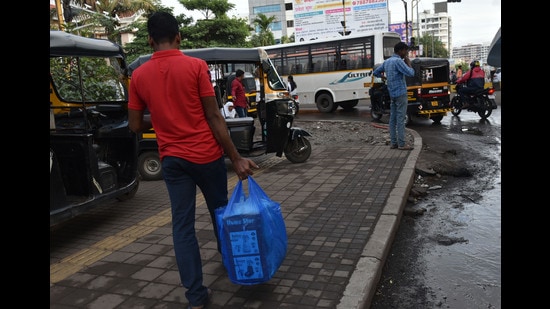PMC to keep strict watch on single-use plastic ban from July 1
The ban on single-use plastic items encompasses wrapping or packaging films around sweet boxes, plastic cutlery, straws and plastic sticks for balloons and ear buds, invitation cards, cigarette packets
PUNE Beginning July 1, the manufacture, import, stocking, distribution and sale of single-use plastic items including plastic bags and polypropylene bags will be prohibited throughout the country. The ban on single-use plastic items encompasses wrapping or packaging films around sweet boxes, plastic cutlery, straws and plastic sticks for balloons and ear buds, invitation cards, cigarette packets etc. Additionally, the thickness of plastic carry bags that are allowed will be increased from 75 microns to 120 microns from December 31 this year.

The Central Pollution Control Board (CPCB) has issued orders to all state pollution control boards to cancel ‘consent to operate’ to units manufacturing banned items. The ban has to be implemented by producers, stockists, retailers, shopkeepers, e-commerce companies, street vendors, and houses in a sustained and long-term manner for it to succeed.
While Maharashtra had banned the use of plastic and thermocol items back in 2018, the sale of plastic- bags and other items still continues in several places.
Leeladevi Agrawal, a stationery vendor near Yerawada, said, “The plastic ban introduced in 2018 reduced the sale of plastic bags and items to a great extent. We have reduced the quantity of plastic materials in our shop. Compared to paper cups, the sale of plastic cups is only 30%. After July 1, we will remove the plastic items completely. As the sales are already less, I won’t face too many issues.”
In spite of the ban on plastic bags since the last few years, plastic bags continue to be used freely by small vegetable vendors and big shops in the market. Vatsala Jagtap, a vegetable seller near the Yerawada village area said, “At present, I get the plastic bags’ packet in shops without any restrictions. But after the ban, I will shift to cloth bags.”
According to the Environment Protection Act, any violation of the ban will lead to punitive action. It will lead to imprisonment up to five years with a fine which may extend to Rs1 lakh, or both. If violations continue, additional fines may extend to Rs5,000 per day. Other action includes seizure of goods, levying of environmental compensation, and closure of operations.
Asha Raut, head of the PMC solid waste management department, said, “We already have a plastic squad in PMC which makes sure that plastic is not being sold in the market. Now, the ward offices will also work towards reduction of plastic. Additionally, there will also be a central team monitoring the process.”
About the existing sale of plastic bags, she said, “The new order will lead to stricter regulation and implementation to completely ban the sale.”
The ban on plastic and thermocol products which was implemented in 2018 could not be sustained for a long time due to lack of proper alternatives. Alok Gogate, head of operations, Swach Pune, said, “We welcome the move to ban single-use, low-value and difficult-to-recycle plastics. But the policies must have a provision for including waste-pickers and other informal sectors in recycling plastics. Along with the ban, the awareness and promotion of alternatives must also be prioritised to establish a sustainable market for it.”





